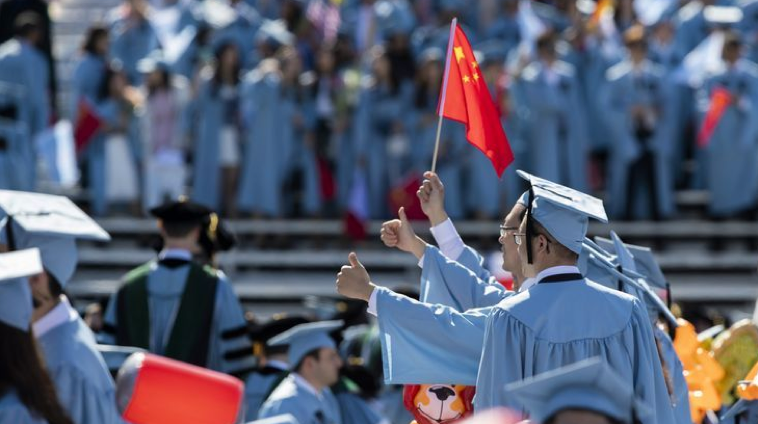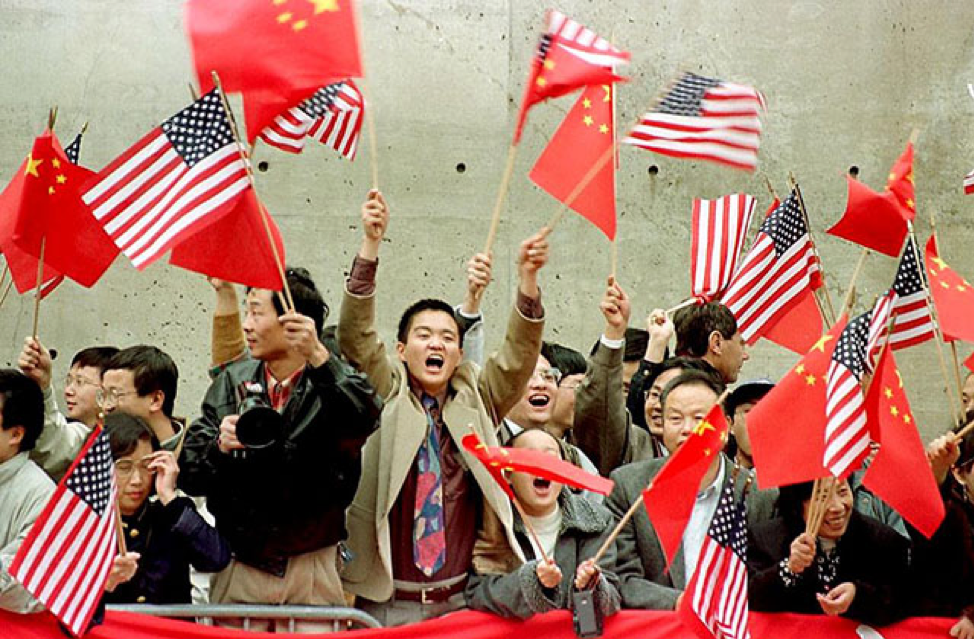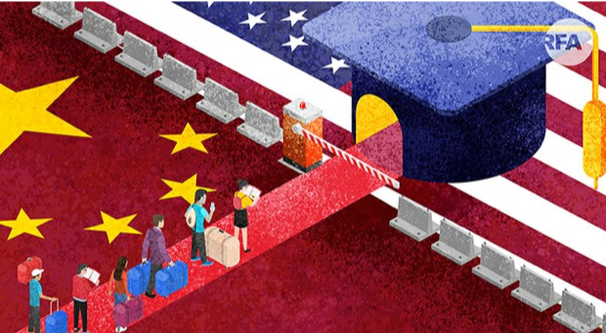Expert Interview
The Changing Political Views of Chinese Students in the U.S.
by Qiao Ye, Sonia Tan, Rachel Lietzow, Masters candidates, UC San Diego School of Global Policy and Strategy
|
|
“We need to understand that the preferences of Chinese students are multidimensional…One person may have rather liberal political views but can also be strongly nationalistic at the same time.”
 In your study, how do you define being “nationalistic”, and how do you differentiate it from being patriotic? Which one better describes Chinese students in the U.S.?
In your study, how do you define being “nationalistic”, and how do you differentiate it from being patriotic? Which one better describes Chinese students in the U.S.?
This study of Chinese students extends our previous research measuring ideology of the Chinese public in another survey. When we started to study the ideological space of the Chinese public, we found that what scholars call the “multi-dimensionality of preferences” played a bigger role in China than in the United States. In the U.S., because policy bundles are organized by the two dominant political parties, people’s ideology likely is anchored to certain points that can reflect their overall preferences.
In the Chinese case, one dimension we are certainly interested in is the political dimension, which measures the extent people are supportive of China’s authoritarian system versus Western democratic institutions. Another dimension is the economy, where some people prefer a freer market while others prefer the state to have a bigger role in resource allocation. The third dimension is on society and culture, where people who are social liberals tend to be in favor of Western social values.
What we found is that a person can be pro-market, liberal on social values and simultaneously nationalistic. In terms of nationalism, scholars have been trying to distinguish between nationalism and patriotism, but there hasn’t been a clear consensus on what nationalism actually is. The sentiment of solely being proud of one’s culture should be considered patriotism. However, if you think your country as being victimized by foreign powers, and that it needs to defend its sovereignty and national interests, that type of sentiment is indicative of nationalism. When we measure ideological spaces, we also use policy items to measure the tendency to support nationalistic policies. People who score higher on that dimension are likely to support more hawkish policy to defend the Chinese government.
For the second part of your question, we need to understand that the preferences of Chinese students are also multidimensional, not a surprise because they are also a part of the Chinese public. One person may have rather liberal political views but can be strongly nationalistic at the same time. Defending China’s sovereignty and national interests does not contradict with wanting democracy in China. If you compare Chinese students in the U.S. and those in China, you will find that Chinese students in the U.S. are more liberal, and are more likely to say that China may need democracy in the long run, while those in China are more likely to think that Western-style democracy may not be the most suitable form of government for China.
One factor that contributes to Western media’s misunderstanding of Chinese students abroad is that a lot of Chinese students overseas don’t know how to articulate their views very well. Even though they have grievances because of either the Western media portrayal of China or their personal encounters of racism, many of them have difficulty generating a well thought out collective narrative as a group in terms of political issues related to China.
“I don’t think discriminatory comments themselves will solely determine how one thinks of the democratic institutions or the Chinese government…but the fact that the U.S. did not respond adequately to the rising racism against Asians is definitely not helping [to consolidate Chinese students’ belief in democratic values].”
Specifically, what part of the democratic system has led to Chinese students’ decreasing interest in democracy?
There are three factors that I think are important. First, poor performance of the United States during COVID-19:
From our observations, Chinese students and the public are likely to pay more attention to the U.S. over other democratic nations. Disappointed that the U.S. is not meeting their expectations, they naturally turn to their home country, China, which at this moment has succeeded in keeping the spread of the virus in check domestically. Our data show that the Chinese students in the U.S. are becoming more supportive of the political status quo in China. However, this is different from saying that they have fully given up on democratic ideals and institutions.
Second, identity as a Chinese national:
If you personally feel attacked by an outside group, you are more likely to cling to your own identity (safe zone) as a Chinese national. We find that this factor may have the strongest influence. It may not necessarily show up as a direct response to political views, but it is very salient. For example, when Chinese students read online articles about China, many of them would pay attention to the comments section, maybe out of a desire to find resonance in a community. When Chinese students read some unfair or discriminatory comments by American commentators, they feel angry. That is a natural reaction to attacks, despite the fact that the attacks may be self-invited through their own active search for those comments.
Third and relatedly, their experience of racism and discrimination:
The influence of racism or discrimination on one’s views is well founded, but public opinion can change very quickly. By 25 years old, a person’s belief system and opinions are already fairly well formed, but there is still opportunity for other influences, such as socialization with their American peers. I don’t think discriminatory comments targeting Asians as a group will solely determine how a Chinese student thinks of democratic institutions or the Chinese government. His or her views should reflect a mixture of many contributing factors, but the fact that the U.S. did not respond very well to the rising racism against Asians, especially Chinese, is definitely not helping [to consolidate Chinese students’ belief in democratic values].

A close-up of President Trump's notes shows that “Corona”
was crossed out and replaced with “Chinese.” He was
speaking with the coronavirus task force on March 19;
Photographer: Jabin Botsford
Image Source: The Washington Post
Overall, I see a lot of tension in the minds of Chinese students. Some of them told me that they appreciate American cultures and values, yet they become very upset and frustrated to see China or Chinese business entities being criticized, punished, or even victimized by the U.S. government. I think the question in their mind is whether they want to embrace democracy but risk being thought of as being unpatriotic in China, or show support to China and forgo some of the goals that they think will be beneficial to the nation in the long run. That is the tradeoff they face, which is also a difficult question for many to answer.
The U.S. performance during COVID-19 gives [Chinese students] additional reasons to think that the American form of government is not best suited for China because it has not delivered the best governance. This is a strong sentiment, and one that is very hard to argue against at this moment, which is unfortunate. The U.S. response to COVID-19 is not only very damaging to people living in this country, but also affecting people in China who have been supportive of democracy. To argue against the Chinese nationalists on this, one may say that other democratic countries such as Singapore, Japan, and some European countries have handled the pandemic effectively. However, Chinese students are mostly looking at the U.S., and maybe sometimes the U.K., two countries that are considered by many as the standard-bearers of liberal democracy.
One lesson we have learned in the past six months is that the opinions of Chinese students are fluid and can change quite easily. If you compare students living in the U.S. and those living in China, students in China become more supportive of their government than Chinese students in the U.S. This means that, although the Chinese students studying in the U.S. have more information about the poor U.S. performance during COVID-19, they are more critical in analyzing the information they receive, and they are less certain about rejecting liberal values and beliefs.
As Chinese public opinion has backfired on democracy, what do you think is a more practical approach to handling the U.S.-China relationship from the U.S. perspective? And how should China react to that approach?
A short answer to your question would be to listen to a talk that Professor Susan Shirk delivered at the University of Pennsylvania last year. Several factors have led to the meltdown of the U.S.-China relationship. People always tend to overemphasize the ideological differences between the two regimes, which may seem right on the surface, but many believe that the most important structural factor is the great power struggle between the two nations. This is especially the case where China is challenging the U.S. economically and militarily.
In terms of America's policy towards China, I agree with Professor Shirk that U.S. pushback to Chinese policies should be more targeted and coordinated. The U.S. should state its national interests and goals more clearly. Current rhetoric makes it sound like all-out containment, yet U.S. core policy goals are rather ambiguous, and their effects questionable.

Another point that I would like to make is about the misunderstanding surrounding the driving force of China’s rise. There seems to be a consensus that the authoritarian government has been responsible for China’s economic success. I think that most political economists studying China would say that the main driving force is actually the private sector, entrepreneurship, although the role of the government is important, especially its reform and opening-up policies. The government succeeded in laying out the infrastructure and providing a suitable environment for economic growth, but we shouldn’t downplay the role of the private sector and entrepreneurs. Attributing too much of China’s success to the authoritarian form of government may cause U.S. policymakers to draw the wrong conclusion about China’s rise. If policy makers in the West infer that China’s non-democratic form of government is responsible for its economic achievements, then they are likely to think that obstructing China’s growth is the way to combat Chinese authoritarianism.
The U.S. has canceled Fulbright programs in China and labeled Confucius Institutes as “foreign missions.” How do you foresee the future of cultural and educational exchange between China and the U.S.?
Many actions taken by the two governments are a result of structural changes caused by great power competition. It is necessary to maintain people-to-people exchange. Shutting down Fulbright programs is not a wise decision because of Fulbright’s historical importance, even during the Cold War. Eliminating this mechanism for individual-level interactions would limit the United States’ influence on Chinese culture. It would contribute to more misunderstanding between the two countries. This in turn can lead to a vicious cycle of bad policies.

Simplistic views of China would cause policy makers to overlook how Chinese public opinion can divert from the official state rhetoric. Chinese people may not necessarily agree with all the policies carried out by the government. We are not paying enough attention to the diverse viewpoints of the Chinese public. Still, I personally do not see the overall situation to be as bad as people think. Since China and America are nuclear powers, the chances of escalated military conflicts are low, but the chill in bilateral relations has resulted in huge losses for both economies and the global market, and it has slowed cooperation in climate change and caused chaos in international institutions, which is very unfortunate.
If the U.S. is truly confident about its system, culture, and values, it shouldn’t worry too much about the Chinese propaganda. People-to-people communication shapes the belief systems of the next generation’s social and political elites. But decreasing confidence in American values has led U.S. leaders to view [cultural exchanges] as national security issues. The U.S. should have more confidence in the resilience of its political system and let ideas compete.

